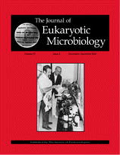
JOURNAL OF EUKARYOTIC MICROBIOLOGY
Scope & Guideline
Advancing Knowledge in Eukaryotic Microbiology
Introduction
Aims and Scopes
- Taxonomy and Phylogenetics of Eukaryotic Microorganisms:
The journal emphasizes the classification and evolutionary relationships of eukaryotic microorganisms, particularly focusing on protists, fungi, and parasites. This includes both traditional morphological studies and modern molecular techniques. - Ecological Interactions and Environmental Adaptations:
Research published in the journal often explores the ecological roles of eukaryotic microorganisms, including their interactions with other organisms and their adaptations to various environmental conditions. - Molecular Biology and Genomics of Eukaryotic Microbes:
The journal provides insights into the molecular mechanisms underlying the biology of eukaryotic microorganisms, including studies on genomics, gene expression, and cellular processes. - Pathogenesis and Host-Pathogen Interactions:
A significant focus of the journal is on understanding the pathogenic mechanisms employed by eukaryotic parasites and their interactions with host organisms, which is crucial for developing therapeutic strategies. - Novel Discoveries and Taxonomic Revisions:
The journal frequently publishes studies that describe new species, genera, and families, as well as revisions of existing classifications based on new morphological and genetic data.
Trending and Emerging
- Microsporidia and Their Pathogenic Mechanisms:
Recent publications have shown a significant rise in research on microsporidia, particularly regarding their unique biology, pathogenic mechanisms, and interactions with hosts, indicating a growing recognition of their impact on health and ecology. - Molecular Phylogenetics and Genomics:
There is an increasing trend in the use of molecular phylogenetics and genomics to unravel the evolutionary relationships among eukaryotic microorganisms. This includes advances in high-throughput sequencing technologies that enable detailed genetic studies. - Ecological and Environmental Impacts of Eukaryotic Microbes:
Emerging themes focus on the ecological roles and environmental impacts of eukaryotic microorganisms, particularly in relation to climate change and ecosystem health, reflecting a broader ecological perspective in microbiology. - Host-Microbe Interactions and Immunology:
A growing number of studies are exploring the complex interactions between eukaryotic microbes and their hosts, including immune responses and the implications for disease, highlighting the importance of understanding these relationships in health contexts. - Biodiversity and Conservation of Eukaryotic Microorganisms:
Research addressing the biodiversity of eukaryotic microorganisms and their conservation in changing environments is gaining traction, as scientists increasingly recognize the importance of these organisms in global biodiversity and ecosystem services.
Declining or Waning
- General Ecology of Eukaryotic Microbes:
There has been a noticeable decline in publications focusing broadly on the ecology of eukaryotic microorganisms without specific context or application, possibly as research becomes more specialized and targeted. - Morphological Studies Without Molecular Data:
Research that relies solely on traditional morphological approaches, without accompanying molecular analyses, has decreased, as the field increasingly values integrative approaches that combine both morphological and molecular data. - Studies on Non-pathogenic Eukaryotic Microbes:
Research focusing on non-pathogenic eukaryotic microorganisms, such as beneficial protists or those in symbiotic relationships, appears to be less frequently published, potentially overshadowed by the more pressing concerns of pathogenic organisms.
Similar Journals

BIOLOGY BULLETIN
Exploring the Frontiers of Agricultural and Biological Sciences.BIOLOGY BULLETIN is a prominent academic journal published by PLEIADES PUBLISHING INC, dedicated to advancing the fields of Agricultural and Biological Sciences as well as Biochemistry, Genetics, and Molecular Biology. With an ISSN of 1062-3590 and E-ISSN of 1608-3059, the journal has been a vital resource for researchers and professionals since its commencement in 1996. Located in the United States, BIOLOGY BULLETIN operates within a highly competitive academic landscape, achieving a 2023 ranking in the Q3 quartile for Agricultural and Biological Sciences and Q4 for Biochemistry, Genetics, and Molecular Biology, highlighting its commitment to delivering impactful research despite its challenges. Researchers seeking to publish their findings will find a platform for significant insights, as reflected in its Scopus rankings, where it stands at #183 and #199 out of 221 in its respective categories, showcasing opportunities for growth and visibility. While currently not an open-access publication, BIOLOGY BULLETIN plays a crucial role in facilitating scholarly communication and fostering an understanding of biological sciences, making it an essential read for academics, professionals, and students alike.

MYCOTAXON
Decoding the Language of FungiMYCOTAXON is a peer-reviewed journal dedicated to the field of mycology, focusing on the taxonomy, systematics, and ecology of fungi. Published by MYCOTAXON LTD, this journal plays a crucial role in advancing our understanding of fungal biodiversity and its significance within various ecosystems. Although it currently does not offer open access options, its contributions are vital to the scientific community, especially with its established presence since 1989. With an HIndex reflecting its relevance and attracting a dedicated readership, MYCOTAXON is recognized within the Q4 quartile in both Ecology, Evolution, Behavior, and Systematics, and Plant Science categories as of 2023. This places it among a critical cohort of journals that contribute to the understanding of ecological dynamics and plant-fungal interactions. Researchers, professionals, and students can benefit from the insights provided in MYCOTAXON, making it an indispensable resource for anyone involved in the study of fungi.
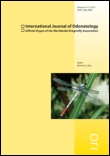
INTERNATIONAL JOURNAL OF ODONATOLOGY
Exploring the Fascinating World of OdonatesINTERNATIONAL JOURNAL OF ODONATOLOGY, published by Wachholtz Verlag GmbH, is a vital resource for researchers and professionals in the fields of Ecology, Evolution, Behavior, and Insect Science. Established in 1998, this journal provides a platform for the dissemination of innovative research pertaining to odonatology, encompassing the ecological and biological interactions of dragonflies and damselflies. With its focus on advancing knowledge within these scientific disciplines, the journal holds a commendable Q3 ranking in Ecology, Evolution, Behavior and Systematics and a Q2 ranking in Insect Science for 2023, reflecting its significance in academic circles. Although it operates without open access, its articles are accessible through institutional subscriptions, allowing for wide dissemination among scholars and practitioners. The journal's commitment to publishing high-quality, peer-reviewed research makes it an authoritative source of information that enriches the study of odonates and their broader ecological contexts. For inquiries, the journal's editorial team can be reached at C/O Fleet7, Fleethorn 7, Kiel 24103, Germany.
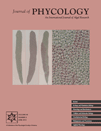
JOURNAL OF PHYCOLOGY
Elevating Knowledge in Plant and Aquatic SciencesJOURNAL OF PHYCOLOGY, published by Wiley, is a premier academic journal dedicated to the realms of Aquatic Science and Plant Science. Established in 1965, it has continuously contributed to the advancement of phycology through rigorous research and scholarly discussions. The journal holds an impressive reputation, classified as Q1 in both aquatic and plant sciences for 2023, affirming its position among the top-tier journals in these fields. With a Scopus ranking of 31 out of 247 in Aquatic Science and 75 out of 516 in Plant Science, it stands in the 87th and 85th percentiles respectively, highlighting its influence and impact. While it is not an open access journal, it offers a wealth of valuable insights and original research articles that are essential for researchers, professionals, and students alike. The JOURNAL OF PHYCOLOGY is a critical platform for the dissemination of knowledge on both fundamental and applied aspects of algae, making it indispensable for those who seek to deepen their understanding of this crucial area of biological science.

ACTA ENTOMOLOGICA MUSEI NATIONALIS PRAGAE
Pioneering Insights into Insect Behavior and SystematicsACTA ENTOMOLOGICA MUSEI NATIONALIS PRAGAE, published by the esteemed NARODNI MUZEUM - PRIRODOVECKE MUZEUM in the Czech Republic, is an influential journal in the fields of Ecology, Evolution, Behavior and Systematics, as well as Insect Science. With an ISSN of 0374-1036 and an E-ISSN of 1804-6487, this journal has established itself as a vital resource for researchers, professionals, and students interested in the intricate world of entomology. Spanning publications from 2005 to 2024, it is recognized for its contributions to the understanding of insect biology, offering insights on ecological interactions and evolutionary relationships. Although it operates as a subscription-based platform, the journal maintains a respectable presence in scholarly circles, positioned in the Q2 quartile for both relevant categories in 2023. ACTA ENTOMOLOGICA serves not only as a repository of significant empirical findings but also as a discourse platform for emerging entomological concepts, making it an essential read for those involved in the biological sciences.

FUNGAL GENETICS AND BIOLOGY
Elevating Knowledge in Fungal Genetics and BiologyFungal Genetics and Biology is a leading peer-reviewed journal published by Academic Press Inc, Elsevier Science, dedicated to advancing the understanding of fungi through innovative genetic and biological research. Since its inception in 1996, this journal has served as a vital platform for the dissemination of critical findings in the fields of Genetics and Microbiology, maintaining a distinguished Q2 category ranking in both disciplines as of 2023. With an ISSN of 1087-1845 and an E-ISSN of 1096-0937, the journal emphasizes the intersection of genetics and molecular biology to explore fundamental questions related to fungal biology that are of paramount importance to various applications in biotechnology, medicine, and environmental science. Researchers, professionals, and students alike will find this journal invaluable as it not only covers current trends and breakthroughs but also encourages collaborative efforts across the scientific community. Fungal Genetics and Biology continues to shape the future of fungal research well into 2024 and beyond, offering rich insights and open access options for a global audience.

Mycosphere
Connecting researchers to the heart of fungal science.Mycosphere is a premier open-access journal published by MYCOSPHERE PRESS, dedicated to advancing the field of mycology and contributing significant insights into ecological and plant sciences. Established in 2010 and headquartered in Guiyang, China, this journal has carved out a vital niche, achieving remarkable rankings in the Scopus database—#3 in Ecology, Evolution, Behavior and Systematics and #4 in Plant Science, both boasting a 99th percentile ranking. With an unwavering commitment to disseminating high-quality research, Mycosphere serves as a critical platform for researchers, professionals, and students alike, encouraging robust dialogue and collaborations across the global scientific community. The journal's accessibility, coupled with its impact factor and Q1 categorizations in 2023 for both ecology and plant sciences, substantiate its role as an essential resource for cutting-edge studies and innovations in the field.
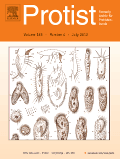
PROTIST
Connecting Science and Discovery in MicrobiologyPROTIST is a leading journal in the field of microbiology, focusing on the diverse and often complex world of protists. Published by Elsevier GmbH in Germany, this academic journal has established itself as a valuable resource for researchers, professionals, and students alike. Covering a wide range of topics within the realm of protistology, including taxonomy, ecology, and evolutionary biology, PROTIST aims to promote the understanding of these essential microorganisms, which play critical roles in ecosystem dynamics and human health. Although it currently holds a Q3 ranking in the 2023 category quartiles for Microbiology, it aspires to elevate its status through high-quality articles and innovative research findings. The journal operates under an open-access model, fostering global dissemination of knowledge and encouraging collaborative research. With its extensive scope—from its convergence starting in 1998 to its anticipated developments through 2024—PROTIST remains a vital platform for advancing the study of protists and their impact on our world.
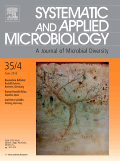
SYSTEMATIC AND APPLIED MICROBIOLOGY
Pioneering Research in Ecology and BiotechnologySYSTEMATIC AND APPLIED MICROBIOLOGY, with ISSN 0723-2020 and E-ISSN 1618-0984, is a prestigious journal published by Elsevier GmbH, located in Munich, Germany. Established in 1983, this journal provides a critical platform for the dissemination of high-quality research in the fields of applied microbiology, ecology, and biotechnology. With a commendable impact reflected in its 2023 Q1 ranking in Applied Microbiology and Biotechnology, and Ecology, Evolution, Behavior and Systematics, along with a Q2 ranking in Microbiology, SYSTEMATIC AND APPLIED MICROBIOLOGY maintains a high standard of scholarly excellence. As part of the Scopus database, it ranks prominently—79th out of 721 in Ecology, and within the top quartiles for its relevant fields, potent in disseminating implications for researchers, professionals, and students alike. Although it does not offer open access, the journal is dedicated to advancing knowledge and innovation in microbiological research, making it an essential resource for anyone in the field seeking to stay abreast of current findings and applications.
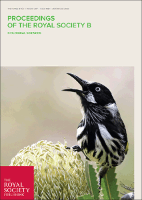
PROCEEDINGS OF THE ROYAL SOCIETY B-BIOLOGICAL SCIENCES
Bridging Disciplines for Scientific ExcellencePROCEEDINGS OF THE ROYAL SOCIETY B-BIOLOGICAL SCIENCES, published by the esteemed Royal Society, stands as a premier platform for disseminating cutting-edge research in the fields of Biological Sciences. With an impressive impact factor reflective of its high citation rates and scholarly contributions, this journal encompasses a wide array of disciplines, including Agricultural and Biological Sciences, Biochemistry, Genetics and Molecular Biology, Environmental Science, and Immunology and Microbiology, consistently ranking in the Q1 category across these fields. Since its inception in 1946, it has been committed to advancing our understanding of biological systems and informing evidence-based practices. Researchers and academics can submit their work without the Open Access barrier, thereby maintaining the integrity of the disciplinary discourse while providing comprehensive insights. The journal's location in the United Kingdom also positions it at the heart of global scientific innovation, making it a vital resource for professionals and students alike who are eager to explore the latest trends and breakthroughs in the biological sciences.